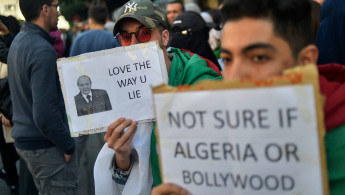'You won't fool us,' Algerians tell Bouteflika
Algeria is headed towards a constitutional crisis as the country's president unilaterally extends his term for a year.
President Abdelaziz Bouteflika's term in office officially comes to end on April 18 - but he has announced, following widespread protests against the 82-year-old seeking a fifth term, that the election scheduled for that day is to be postponed, and that he will not stand again for election.
Bouteflika, known to be in poor health, said he would remain as president in order to hold a "National Conference" and oversee a fresh election.
Lawyers say his move is not allowed by the nation's constitution, which reads "the president's mandate is extended only in times of war". Algeria is not currently in a state of war.
"During the state of war, the constitution is suspended, the president of the republic assumes all the powers. When the mandate of the president of the republic expires, it is automatically extended until the end of the war," reads Article 110 of the constitution.
"We can't manage a political crisis with legal instruments, it's impossible," legal expert Fatiha Benabbou told Algerian media. "Our constitution is not a law that reflects the balance of power, it is a constitution of peace. That's why the solution must be found with political resources."
In a video posted on his social network account, lawyer and human rights activist Mustapha Bouchachi adds: "The postponement of the presidential elections and the renunciation of the fifth term constitute a partial victory for the popular mobilisation [protesters]."
 |
The cancellation of the presidential election of April 18 is a step in the fight and struggle of society to recover its sovereignty |  |
The "transition period", expected as part of Bouteflika's National Conference, "must be led by a government composed of credible personalities in the eyes of the Algerian people".
Rassemblement Action-Jeunesse ["Gathering Action-Youth"], a local civil society organisation born in the early 1990s, said Bouteflika's move was "a great Machiavellian and devious manoeuvre aimed at stifling the protest movement".
"The cancellation of the presidential election of April 18 is a step in the fight and struggle of society to recover its sovereignty," the group added.
Streets not giving up
On Monday night, following the president's announcement, the response was swift.
Thousands of Algerians around the country took to the streets, once again, to express their categorical rejection of Bouteflika's proposal.
Twitter Post
|
Protestors expressed their frustration in a bid to show the long-ruling Algerian "Pouvoir" - the actual power-base known to be the ones really running Algeria during Bouteflika's ill-health - that this isn't what they were asking for.
"They want to contain our protesting movement and contain our frustration for freedom and change of regime," a young protester told The New Arab. "They will not fool us. We won't give in."
It's clear that the Algerians won't end their protest movement and accept what they consider to be only an attempt to win time.
How is the National Conference to be held?
Despite it still being unclear how the government is planning to organise this conference, the opposition has already said it is against it.
Boutaleb Atika is member of the Talae El Houryat, an opposition political party led by Ali Benflis, a former prime minister who held office in the early 2000s.
"We first called for such a National Conference - but not one led by a government-designated people," she told The New Arab. "In the president's proposition for a National Conference for transition, there is a continuity of practice that we and the people are denouncing.
"These decisions remain in the hands of those we are protesting against," she added.
"The entire country is living an unconstitutional act of force, as the constitution was violated several times before, and now that's a fourth term that is continuing into a fifth term that is imposed without elections."
 |
We need to have people who are totally independent from the country's political system and in whom the people will have faith |  |
The transitional period, following April 18, could last longer than the government has announced, Atika says.
"The people ask those guys ruling the country to put in place institutions that are totally independent and that won't be biased, but led by real national skills."
The opposition has no list of names of people who could be appointed to lead the transitional period.
According to Atika, the opposition has first to agree upon a list of figures. "We need to have people who are totally independent from the country's political system and in whom the people will have faith," she said.
"These people have to emerge from the civil society."
What's next?
Many believe that it's much too early to talk about a "next president" as such a prospect remains a long way off. A new constitution is likely. Most importantly, whatever government is to follow Bouteflika's reign will have its work cut out for it to restore the Algerian people's faith in the country's governance as it responds to their various social, political and economic grievances.
Abdelaziz Bouteflika's successor, if any, has to face a lengthening list of social issues, including a high rate of unemployment. The majority of these unemployed are young people. According to the latest figures, 70 percent of the Algerian population is under the age of 30.
Most of the population have no real access to economic opportunities, while the country's economy and revenues are shackled to gas and oil prices.
The country also faces a string of security issues, with the most significant threats coming from the Sahel region. The country's southern borders have been totally closed and militarised for years.
Massinissa Benlakehal is a freelance journalist, covering politics, society, human rights and security related issues in North Africa.
Follow him on Twitter: @mbenlakehal



